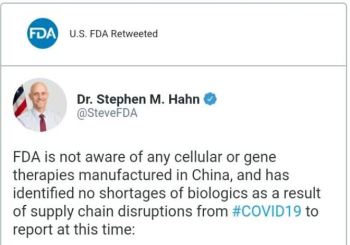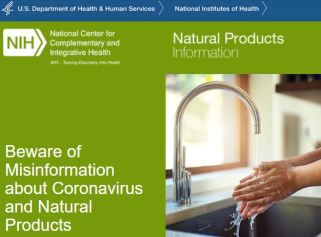COVID-19 News: New expedited diagnostic testing policy, New York SARS-CoV-2 diagnostic authorization, Medical product shortages, Misinformation about natural products

Policy for COVID-19 Diagnostics Testing in Laboratories Certified to Perform High Complexity Testing under CLIA prior to Emergency Use Authorization
Policy for novel COVID-19 molecular diagnostics tests developed and used in CLIA laboratories prior to FDA issuance of emergency use authorizations (EUA)
- Public health emergency circumstances requiring rapid diagnostic testing to control emergence
- Rapid COVID-19 detection with accelerated policy enabling CLIA laboratories for more rapid testing capacity
- Immediately in Effect guidance
- Accelerated Emergency Use Authorization Template

New York SARS-CoV-2 Realtime Reverse Transcriptase (RT)-PCR Diagnostic Panel
Wadsworth Center, New York State Department of Public Health
INDICATION: Presumptive qualitative detection of nucleic acid from SARS-CoV-2 in nasopharyngeal/oropharyngeal swabs and sputa collected from individuals who meet CDC COVID-19 clinical and/or epidemiological criteria
DIAGNOSTIC PANEL:
- Human Specimen Control (HSC): A human cell culture preparation used as an extraction control and positive control for the RNase P primer and probe set that is extracted and tested concurrently with each specimen extraction run
- SARS-CoV-2 Positive Control (SARS-CoV-2 Pos): Run with each batch of specimens. Monitors improper assay setup, reagent failures of rRT-PCR reagents and reaction conditions
- No Template Control (NTC): Nuclease-free water included in each run. Monitors for reagent and system contamination
- RNase P (RP) control in clinical samples: The RP primer and probe set is included in each run to test for human RNase P, which controls for specimen quality and demonstrates that nucleic acid was generated by the extraction process
REGULATORY PATHWAY: Emergency Use Authorization
- SARS-CoV-2 can cause a serious or life-threatening disease or condition
- Based on the totality of scientific evidence, reasonable to believe diagnostic panel may be effective in diagnosing COVID-19
- There is no adequate, approved, and available alternative

COVID-19 Supply Chain Update
Outbreak would likely impact the medical product supply chain, including potential disruptions to supply or shortages of critical medical products in the U.S
- Alert from a manufacturer about drug shortage due to disruption in China manufacturing
- In contact with >180 manufacturers of human drugs
- In contact with 63 manufacturers of essential medical devices
- Preparing for increasing demand in personal protective equipment—surgical gowns, gloves, masks, respirator protective devices etc
- Not aware of any cellular or gene therapies that are made in China
- No reports of transmission by food or food packaging
Proposals to prevent or mitigate medical product shortages
- Lengthen expiration dates
- Require risk management plans
- Improve data sharing and require more accurate supply chain information
- Establish reporting requirements for device manufacturers

Image credits: FDA, NIH